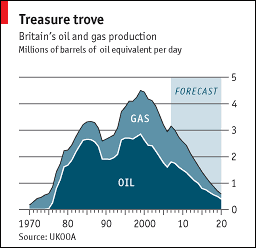Aberdeen Shrimper
The Man who sold the world
Alex Salmond says we should go our separate ways, with Scotland taking the oil. But would Scotland be any better off?
According to Tyler's fag packet, a fiscally independent Scotland looks like this (2006-07 figures- for derivation see footnote):
Domestic (non-North Sea) taxes: £40bn
plus
North Sea taxes: £8bn
equals
Total tax revenue: £48bn
With expenditure running at £53bn, that means Scotland takes the High Road carrying a £5bn fiscal deficit.
Which compares with its 8% GDP share of the aggregate £31bn UK fiscal deficit, coming in at £2.5bn. So net net, a fully independent Scotland is £2.5bn pa worse off. Or approximately 2.4% of its £106bn pa GDP.
That's by no means a disaster. But it does mean that even allowing for Scotland keeping its oil revenue, the rest of us make an immediate gain if Salmond gets his way.
So, the rest of us would gain more from Scottish independence with each passing year. Which is why this time around we won't be calling on the Duke of Cumberland to persuade them to stay in the Union.
And why Salmond has to crack on: the longer he leaves it, the less saleable the whole deal will be to Scottish voters.
Footnotes: An independent Scotland's tax revenues and expenditure have been derived as follows: 1. Scottish income, council and business taxes are official stats. Other UK taxes have have been apportioned on the basis of Scottish Gross Value Added. 2. North Sea taxes (£9bn) have been apportioned on the basis that Scotland gets 90%. 3. Expenditure has been allocated using HM Treasury's PESA regional split for the approximate 80% of TME covered, and population share for the remaining 20%.
UPDATE Looks like Scottish voters have been running their own fag packet calcs: support for independence has just fallen to 23%.
According to Tyler's fag packet, a fiscally independent Scotland looks like this (2006-07 figures- for derivation see footnote):
Domestic (non-North Sea) taxes: £40bn
plus
North Sea taxes: £8bn
equals
Total tax revenue: £48bn
With expenditure running at £53bn, that means Scotland takes the High Road carrying a £5bn fiscal deficit.
Which compares with its 8% GDP share of the aggregate £31bn UK fiscal deficit, coming in at £2.5bn. So net net, a fully independent Scotland is £2.5bn pa worse off. Or approximately 2.4% of its £106bn pa GDP.
That's by no means a disaster. But it does mean that even allowing for Scotland keeping its oil revenue, the rest of us make an immediate gain if Salmond gets his way.
Plus, of course, the oil is a fast depleting asset:

So, the rest of us would gain more from Scottish independence with each passing year. Which is why this time around we won't be calling on the Duke of Cumberland to persuade them to stay in the Union.
And why Salmond has to crack on: the longer he leaves it, the less saleable the whole deal will be to Scottish voters.
Footnotes: An independent Scotland's tax revenues and expenditure have been derived as follows: 1. Scottish income, council and business taxes are official stats. Other UK taxes have have been apportioned on the basis of Scottish Gross Value Added. 2. North Sea taxes (£9bn) have been apportioned on the basis that Scotland gets 90%. 3. Expenditure has been allocated using HM Treasury's PESA regional split for the approximate 80% of TME covered, and population share for the remaining 20%.
UPDATE Looks like Scottish voters have been running their own fag packet calcs: support for independence has just fallen to 23%.













